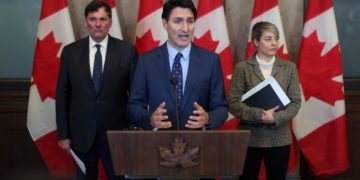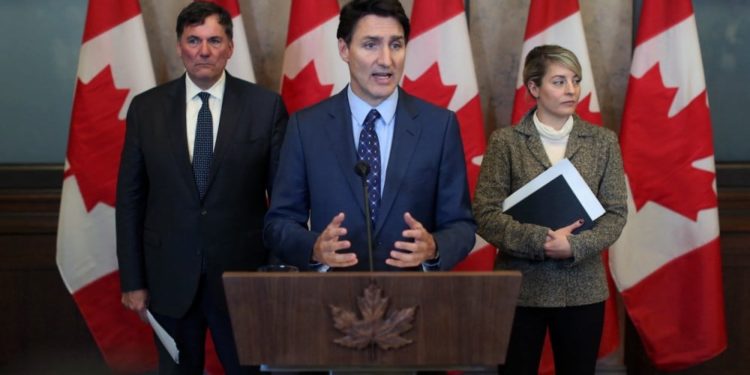A long-simmering diplomatic spat between India and Canada escalated dramatically on Monday as Ottawa expelled six Indian officials, including the country’s top diplomat, implicating them in the killing of a Sikh separatist who was fatally shot outside a temple in British Columbia last year.
India, which has rejected the allegations, responded in kind by ejecting six Canadian diplomats, including the country’s acting high commissioner.
A long-simmering diplomatic spat between India and Canada escalated dramatically on Monday as Ottawa expelled six Indian officials, including the country’s top diplomat, implicating them in the killing of a Sikh separatist who was fatally shot outside a temple in British Columbia last year.
India, which has rejected the allegations, responded in kind by ejecting six Canadian diplomats, including the country’s acting high commissioner.
An ongoing Royal Canadian Mounted Police (RCMP) investigation into the 2023 killing of Hardeep Singh Nijjar, an Indian-born citizen of Canada, found links to the six Indian officials, the Canadian government said. After India refused to waive their diplomatic immunity so that they could cooperate with the probe, Ottawa moved to expel the officials.
“The decision to expel these individuals was made with great consideration and only after the RCMP gathered ample, clear and concrete evidence which identified six individuals as persons of interest in the Nijjar case,” Canadian Foreign Minister Mélanie Joly said in a statement.
The Indian officials are alleged by the RCMP to have been directly involved in the gathering of intelligence on Sikh separatists in Canada, which is home to the largest Sikh population outside of India, according to Canadian government statistics.
Canada has previously accused India’s government of involvement in the killing of Nijjar, who was designated a terrorist by New Delhi in 2020 for his leadership of an organization called the Khalistan Tiger Force. The Indian government pointed to Nijjar’s social media posts, saying that that they contained “seditionary and insurrectionary imputations” that were “attempting to create disharmony among different communities in India.”
India has consistently denied involvement in Nijjar’s death, and in a lengthy statement published on Monday, New Delhi accused Canadian Prime Minister Justin Trudeau of “smearing India for political gains,” adding that Trudeau’s government had “not shared a shred of evidence” with India and has ignored multiple extradition requests of “terrorists and organized crime leaders living in Canada.”
The diplomatic dust-up has been decades in the making. Scores of Sikhs fled India in the 1980s and 1990s amid a violent crackdown on the Khalistan movement, which called for a separate nation-state for Sikhs in the Indian state of Punjab.
Canada was among the most popular destinations at the time, and the country’s Sikh population now numbers nearly 800,000, according to the 2021 census. And while supporters of Khalistan are believed to make up only a small proportion of that population, the blurring of domestic and foreign policy in Canada—coupled with an increasingly belligerent Indian foreign policy under Prime Minister Narendra Modi—has set the stage for a breakdown in bilateral relations.
“Of all the countries [where the Sikh diaspora fled in the 1980s], Canada is the only one where the population is large enough to sway constituencies in domestic politics,” said Aparna Pande, the director of the India Initiative at the Hudson Institute, a think tank based in Washington, D.C. “India as a 77-year-old modern state was created by the breakup of the country, and it has dealt with several separatist movements since then. So for the Indian state, any individual who talks about separatism is an anathema, and anyone who supports this is seen to be supporting the breakup of the country,” she added.
The long-standing nature of the tensions was also highlighted by the RCMP alleging the involvement of Indian government agents in “serious criminal activity” more broadly, saying it had “successfully investigated and charged a significant number of individuals for their direct involvement in homicides, extortions and other criminal acts of violence” over the past few years.
The diplomatic rupture comes at a time when India has increasingly been accused of practicing “transnational repression,” a term used to describe efforts by governments to reach across borders to harass, silence, and even kill critics abroad.
Transnational repression is a growing phenomenon that is mostly commonly associated with authoritarian states such as China and Russia, the latter of which has made headlines in recent years over its brazen attempts to poison and assassinate its critics in Europe.
Governments have long sought to keep tabs on—and at times silence—their critics abroad, but the rising tide of authoritarianism around the world and the advent of the internet have fueled a recent surge. “Everything shows that these trends are on the rise,” said Dana Moss, a professor at the University of Notre Dame who studies the phenomenon.
Last week, Ken McCallum—the head of MI-5, Britain’s domestic intelligence agency—said in rare public remarks that the country was facing a “staggering rise” in assassination and sabotage attempts from Russia and Iran. Both countries have sought to recruit criminals to carry out the attacks, with 20 potentially lethal Iranian-backed plots uncovered since the beginning of 2022.
Populist democracies such as Turkey and India are also becoming increasingly aggressive in pursuit of their political foes. In November 2023, the U.S. Justice Department accused an Indian official of directing a plot to assassinate a U.S.-based Sikh activist. And Ankara has dramatically stepped up efforts to forcibly return its perceived enemies from overseas since an attempted coup in 2016.
Yet these same countries’ geopolitical importance often complicates Western efforts to respond forcefully to their actions. Turkey is a NATO ally, for instance, and India plays a crucial role in Western efforts to balance China in the Indo-Pacific.
This balancing act was thrown in stark relief by the 2018 killing of Saudi Washington Post columnist Jamal Khashoggi by Saudi operatives in the country’s consulate in Turkey. U.S. President Joe Biden vowed on the campaign trail in 2019 to turn Riyadh into a “pariah” state over the killing, yet his administration has instead courted the country, viewing it as a pivotal player in U.S. efforts to redraw the contours of the Israeli-Palestinian conflict.
India’s linchpin role in Western efforts against major adversaries such as China and Russia has similarly complicated the United States’ own allegations against the Modi government of assassination attempts against a Sikh separatist on U.S. soil. In its own indictment, unsealed in November, the Justice Department accused an Indian citizen named Nikhil Gupta of colluding with an unnamed Indian government official to try to assassinate Gurpatwant Singh Pannun, a pro-Khalistan activist and U.S. citizen based in New York. Gupta was arrested in the Czech Republic and extradited to the United States earlier this year.
Pande, the expert from the Hudson Institute, said that the United States’ relatively by-the-book approach to the Pannun case has stood in stark contrast to Canada’s approach to Nijjar’s case. In the latter, Trudeau and Joly have been at the forefront of publicly leveling accusations against India. Biden, on the other hand, has allowed himself a degree of diplomatic wiggle room by letting the Justice Department and intelligence agencies take the lead without weighing in publicly himself.
“The U.S. didn’t stand on a bully pulpit,” Pande added.
India has also treated the U.S. allegations far more delicately, pledging cooperation from the outset. Even as Canada’s and India’s mutual diplomatic expulsions were confirmed on Tuesday, an Indian investigative team arrived in Washington, D.C., to discuss the attempted Pannun assassination with U.S. officials.
According to a report in the Hindustan Times, New Delhi also informed the Biden administration that the government official referenced in the November indictment—known only as “CC-1”—is no longer in the government and has been placed under arrest. (The Indian Embassy in Washington declined to comment).
Those developments reflect the degree of realpolitik between India and the United States, whose bilateral relationship has grown markedly closer under the Biden administration. And while the broader fallout of the India-Canada breakdown remains to be seen (further complicated by the fact that the number of Indians emigrating to Canada has more than quadrupled over the past decade), Washington will likely face limited collateral damage.
“There’s a huge difference between the India-Canada relationship and the India-U.S. relationship in every sense,” Pande said. “The U.S. has a remarkable ability to engage with countries that don’t get along with each other.”
The post Why India and Canada Expelled Each Other’s Top Diplomats appeared first on Foreign Policy.



















